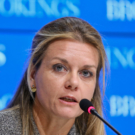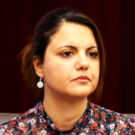Speakers

Federica Saini Fasanotti
Senior Associate Research Fellow
Italian Institute for International Political Studies (ISPI)

Najla El Mangoush
Graduate Lecturer
George Mason University

Karim Mezran
Director and Resident Senior Fellow
North Africa Initiative, Atlantic Council
Moderator
Event Summary
On May 16, 2019, Arab Center Washington DC (ACW) hosted a panel discussion at the National Press Club titled “The Future of Libya: Between Internal Rivalry, Regional Influence, and US Policy.” The speakers were Karim Mezran, Director and Resident Senior Fellow, North Africa Initiative of the Atlantic Council; Najla El Mangoush, Graduate Lecturer at George Mason University and Adjunct Faculty member at Northern Virginia Community College; Kristian Coates Ulrichsen, Non-resident Senior Fellow at ACW and Baker Institute Fellow for the Middle East, Rice University; and Federica Saini Fasanotti (via video-conference), Non-resident Senior Fellow at The Brookings Institution and Senior Associate Research Fellow, Italian Institute for International Political Studies. ACW Executive Director Khalil Jahshan served as moderator.
Khalil Jahshan explained that Libya continues to have two competing governments that claim executive authority: the Tripoli-based Government of National Accord (GNA) that is recognized by the international community, headed by Prime Minister Fayez al-Sarraj; and the Tobruk-based interim government of Prime Minister Abdullah al-Thinni that operates in Libya’s east and is supported by the Libyan National Army (LNA) under the command of General Khalifa Haftar. Jahshan said that the LNA has advanced across the south of the country, seizing control of towns and oil fields. The Islamic State also controls some desert areas in the south. The GNA and the LNA are currently fighting on the outskirts of Tripoli. The battles have caused significant displacement of civilians—about 70,000—and many casualties. As the two rival governments vie for control, Russia, NATO, the United Nations, and the United States have made statements about the situation, calling for starting a national dialogue and fighting terrorism. Jahshan asked the panelists to assess the current domestic situation in Libya and its regional implications, the role of the United Nations, Europe, and Middle Eastern countries in the conflict, and the possible changes of US policy toward Libya.
Karim Mezran characterized Libya as “in the eye of the hurricane.” Although the attack by Haftar seemed to surprise everyone, he noted that Haftar has been transparent from the beginning about his intentions, including that he was not interested in negotiations and that his aim was to be the leader of Libya. For its part, the Islamic State is very pleased with Haftar’s offensive and is capitalizing on the crisis. Mezran asserted that it is now impossible for Sarraj to sit down with Haftar in Abu Dhabi to negotiate a solution as they did a few months ago. As potential options toward resolution decrease, Mezran said that Europeans need to be proactive and consider actions such as enforcing a no-fly zone and using all diplomatic tools to respect the UN arms embargo on Libya. Indeed, he concluded, it will take a lot of effort by the international community to spur anything positive to happen in the contested country.
Najla El Mangoush asked, why are Libyans fighting each other today? She said that analysts of Libya’s politics are neglecting to take into account the roots of the conflict, which include a long history of colonization, the brief period of the kingdom in the fifties and sixties, then the dictatorship of Qadhafi for 42 years. She pointed to the longstanding grievance of Libyans regarding mistrust of leaders; since the euphoria and optimism of the revolution, she noted, there has been no capable institution to handle the transition nor an effective police force to help civilians. Borders are open and rife with smuggling and trafficking. As for the United Nations, she continued, it is perceived as illegitimate in Libya: no one trusts it, especially because no one represents ordinary Libyan citizens in UN negotiations. She urged the principals to think about the people in terms of safety, security, a sense of dignity, and efforts toward healing from the trauma, improving institutions to include transitional justice, and reforming the police and justice sectors. She concluded by saying that ultimately, Libyans have responsibility for Libya and need to work hard to create local leadership—and involve everyone in the conversation, both moderates and extremists—with international support.
Kristian Coates Ulrichsen said that a big part of the problem has been how the tensions in other parts of the Middle East have been playing out in Libya. Outsiders, he explained, often have a top-down agenda and do not recognize local priorities, especially in the current fluid situation in Libya—often it is not completely clear whom they are empowering. Because an early consensus did not emerge after the revolution, Libya became an open area for external influence. The United Arab Emirates, Egypt, and Russia continue to support Haftar as part of a cautious and region-wide campaign against what they consider is the Islamization of the Middle East. The European Union is “hamstrung,” Ulrichsen continued, and the United States has an unbalanced set of priorities in Libya. Generally, there are multiple and competing agendas at play in the immediate future there. The external actors who back Haftar are realizing that the military solution is not working as the general had hoped; therefore, Ulrichsen asked, how far will they go in supporting him?
Federica Saini Fasanotti started with the question, why did Libyans permit all these external interventions? She said that after the revolution, the country immediately entered a time of civil war and was not prepared to govern itself. Local, regional, and international factors impeded the natural process of political transition in Libya and the coalescing of legitimate leadership. For his part, Haftar would not be as powerful now without the help of the UAE, Russia, and Egypt; and for Qatar and Turkey, Libya has become a terrain for proxy wars. As for France and Italy, Fasanotti said, they have the same objectives in this situation, including curbing migration, fighting terrorism, and ensuring access to energy. However, too often diplomats approach Libya with little knowledge of its history and social dynamics and without a full understanding that achieving democracy not only requires a sustained and long effort, but also the Libyans’ strong motivation to work toward that goal. Fasanotti said that the United States has been largely absent regarding Libya, with conflicting statements by President Donald Trump and Secretary of State Mike Pompeo. What Washington can do, she suggested, is to pursue two paths: use its weight to moderate tensions between the Haftar and Sarraj factions in the country, and manage the international efforts at diplomacy. “If the United States speaks with a strong voice,” she said, both France and Italy will listen.
Event Photos


